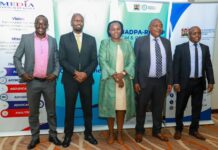By Talkafrica Correspondent
Nairobi, Kenya: The just concluded 2nd African Media Convention held in Lusaka, Zambia saw over 300 media stakeholders and practitioners commit to upholding press freedom. The convention was hosted by the Southern Africa Editors’ Forum (SAEF). The participants strongly agreed with the fact that freedom of expression is a driver of all other human rights, hence making a declaration.
The declaration read;
We, the participants at the 2nd African Media Convention – World Press Freedom Day, held in Lusaka Zambia, 11-13 May 2023 acknowledge the state of the media in Africa, in reference to this year’s theme and reports from the assessments conducted by the Africa media stakeholders in 2022.
Guided by the 2023 WPFD theme: “Freedom of Expression as a driver for all other human rights”.
Noting with deep concern that violations against freedom of the press continue despite thirty (30) years that have passed since the UN General Assembly proclaimed May 3 as World Press Freedom Day, and 75 years since the Universal Declaration of Human Rights was adopted.
Recalling the 2022 Arusha Declaration for World Press Freedom Day 2022 and emphasizing the implementation of its recommendations.
Deeply concerned about the levels of impunity and rising cases of violations against journalists and media workers in Africa which erodes the rights to freedom of expression and opinion, access to information, assembly, and association, and to political participation.
Further concerned that many areas of journalistic practice have been criminalized, with the adoption of cybercrime laws prohibiting the publication of false news or news deemed to threaten national security or public health.
Cognisant that social media remains largely unregulated resulting in the dissemination and amplification of misinformation, disinformation, and hate speech.
Deeply concerned about the enactment of laws and policies aimed at enhancing control and curtailment of the digital civic space, surveillance and interception of communication, the registering and licensing of online content creators, and limiting the use of encryption.
Emphasizing the urgent need for enhanced collaboration between the media in Africa, governments, internet intermediaries, private and public sectors, academia, civil society, national and regional human rights bodies, and researchers to mitigate the effects of violations of the safety of journalists and media workers.
Regretting that some African Governments have initiated restrictive measures, including the enactment of laws and policies which curtail media freedom, beyond the limitations and responsibilities enshrined in the International Covenant on Civil and Political Rights (ICCPR) and other international, regional, and national laws and instruments.
Recognizing the unique challenges women journalists face and the need to ensure provisions for press freedom, freedom of expression, access to information and the safety of journalists adequately address the concerns inhibiting a conducive offline and online environment.
Declaring to commit and engage a multi-stakeholder approach to collectively work on challenges facing the media in Africa.
Reaffirming support to Aspiration three (3) of Agenda 2063: The Africa We Want, which envisions “an Africa of good governance, democracy, respect for human rights, justice and the rule of law”.
Desiring that all AU Member States in Africa commit to assessing the progress of SDG target 16.10 “Public access to information and fundamental freedoms in accordance with national legislation and international agreements”.
Noting the progress made on the continent on the enactment of laws guaranteeing the right to information.
Encouraging countries without laws guaranteeing the right to information to do draw them urgently.
Declaring the Lusaka Declaration as a pledge of African Media Stakeholders to rekindle the vitality of the Universal Declaration of Human Rights @75th anniversary as a renewal of worldwide consensus on human rights.
 Media stakeholders attending the 2nd African Media Convention in Lusaka:
Media stakeholders attending the 2nd African Media Convention in Lusaka:
Renew calls to engage in coalition building among all media stakeholders in Africa to advocate for press freedom to advance human rights in accordance with the Universal Declaration of Human Rights.
Appoint a Steering Committee of nine (9) members to guide the strategic evolution of the annual African Media Convention drawn from Media (4), Civil Society (2) UNESCO (1), AU (1), and Academia (1). The steering committee will strive for equal gender representation and composition reflective of the diverse geographical scope of the continent.
Further empower the Steering Committee to set up an annual Africa Media Review Journal to provide in-depth documentation of media developments and the African Media Convention.
Request the steering committee of the nine members to establish follow-up mechanisms for the implementation of this and past recommendations on press freedom, access to information, and safety of journalists on the African continent.
Draw attention to media viability and sustainability of legacy media given rising concerns about their survival as a result of competition from online platforms, COVID-19-induced enforced layoffs and downsizing, and the advent of Artificial Intelligence Generative Pre-Trained Transformer.
Highlight that the consequences of limited press freedom further exacerbate gender bias and discrimination that women journalists face in their work including online violence, sexual harassment, and the gender pay gap, among other challenges.
Transmit recommendations to the Media in Africa
Endorse the continued organization of the African Media Convention as an annual event in commemoration of the WPFD and to be hosted in an African geographic location on a rotational basis, in partnership with UNESCO, the African Union, its bodies, and RECS as co-hosts.
Reaffirm the Arusha recommendation of the annual assessment of the status of press freedom, access to information, and safety of journalists in AU member states and welcomes the African Union as a partner in this activity.
Encourage Journalists in Africa to subscribe to ethical standards in conformity with international best practices.
Protect and promote an enabling and safe environment – including physical, psychological, and economic safety – for journalists in and outside the newsroom regardless of gender.
 Transmit recommendations to the African Governments
Transmit recommendations to the African Governments
Call on African Governments to repeal laws that impinge on freedom of expression and media freedom and ensure compliance with the established international standards on human and constitutional rights.
Further, call upon all relevant stakeholders to recognize and address the significant threat posed to media freedom by the business models and practices. It is crucial that immediate action be taken to enhance transparency and accountability in relation to content governance policies, moderation practices, and the curation of news and content.
Emphasize the implementation of the UN Plan of Action on the Safety of journalists and the issue of impunity by ensuring the active engagement of duty bearers and media stakeholders at all levels.
Recommend the setup of a national minimum wage for journalists per country as set out in ILO Convention 11 (ILO Minimum Wage Fixing Convention) and equal pay for equal work done by all regardless of their gender as spelled out in ILO Convention 100 on the principle of equal remuneration for all workers.
Propose the establishment of initiatives to safeguard the safety, security, and mental wellbeing of journalists across Africa.
Draw the attention of Governments in Africa to pursue equitable sharing of revenues by Tech Giants to sustain ensure journalism and media sustainability and viability.
Transmit recommendations to the civil society and international community
Call upon Civil Society Organisations in Africa to collaborate and support journalists and their institutions in resource mobilization, individual and institutional capacity strengthening, research, advocacy actions, and coalition building in defending the freedom of expression and press freedom.
Draw attention of the importance of the international community in ensuring the development and consolidation of freedom of expression and press freedom.
Call upon the international community to provide the necessary mechanisms for documenting the violation of journalists’ rights and holding the violators to account.
Emphasize the importance of research and data documenting the experiences of journalists so as to develop research-informed action and initiatives.
Transmit recommendations to the African Union, its Bodies, and Recs
Recall the mandate of the AU-STC on Communication and Information Communications Technology (C-ICT STC) which includes overseeing the development and implementation of policies on access to information and freedom of expression; overseeing the promotion of the capacity of African media and aligned to the AU Digital Transformation Strategy for Africa (2020-2030).
Applaud the AU for establishing the media fellowship programme as a cross-border collaborative platform contributing to the Agenda 2063 aspirations.
Now call on the AU to build the capacity of the African media practitioners and the industry at large, in partnership with the media development partners and Tech companies, aimed at boosting the media viability in the AU member states.
Welcome the AU, its bodies, and Regional Economic Commissions to co-host and support the Annual African Media Conventions and further request submission of this recommendation to the AU Specialised Technical Committee on Communication and ICT (STC-CICT).
Further welcome the AU and its bodies to partner with the African media stakeholders in carrying out the annual assessment of the status of press freedom, access to information, and safety of journalists in AU member states and further requests submission of this recommendation to the AU Specialised Technical Committee on Communication and ICT (STC-CICT).
Request that the various policies and frameworks that exist to guide AU Member States towards press freedom highlight the concerns of the additional level of self-censorship by women journalists due to the gender-based violence and other gender discrimination they experience in their line of work.
Request the Africa Peer Review Mechanisms (APRM) to include indicators of press freedom, access to information, and the safety of journalists in its Governance Index.
Appeal to the APRM to review and update the press freedom, access to information, and safety of journalists indicators as a mechanism to monitor press freedom abuses in Africa and use the same to hold to sanction violators of freedom of expression and press freedom.
Urge the African Commission on Human and Peoples’ Rights to do a 10-year review and update of the 2013 African Model Law on Access to Information, to ensure compliance with the 2019 Declaration of Principles on Freedom of Expression and Access to Information in Africa, and particularly to make it fit for purpose in the digital age.
Further request the Special Rapporteur on Freedom of Expression and Access to Information to advocate for the entrenchment of and respect for media freedom across Africa by lobbying governments to repeal all draconian laws, and respect local and international instruments to protect journalists against online and offline harm.
Transmit recommendations to the Media Development Partners
Call upon UNESCO to lead efforts to create an African media fund to finance and enhance media sustainability and viability given the financial challenges facing most media organisations in the continent. This is necessary to protect the media from political and economic pressures and thus consolidate the freedom of the media in Africa.
Further request UNESCO to encourage OHCHR and UN Resident Coordinators in Africa to support Press Freedom (and the African Media Conventions) as per the recommendations made at the 2023 United Nations regional workshop on freedom of expression, access to information, and the safety of journalists for Africa held in Victoria Falls, Zimbabwe.














